Restaurant review: Alchemists’ Kitchen
Our restaurant reviewer digs into the mysterious arts after a lunch at this Brighton restaurant, where a wood-fired oven is the centrepiece.
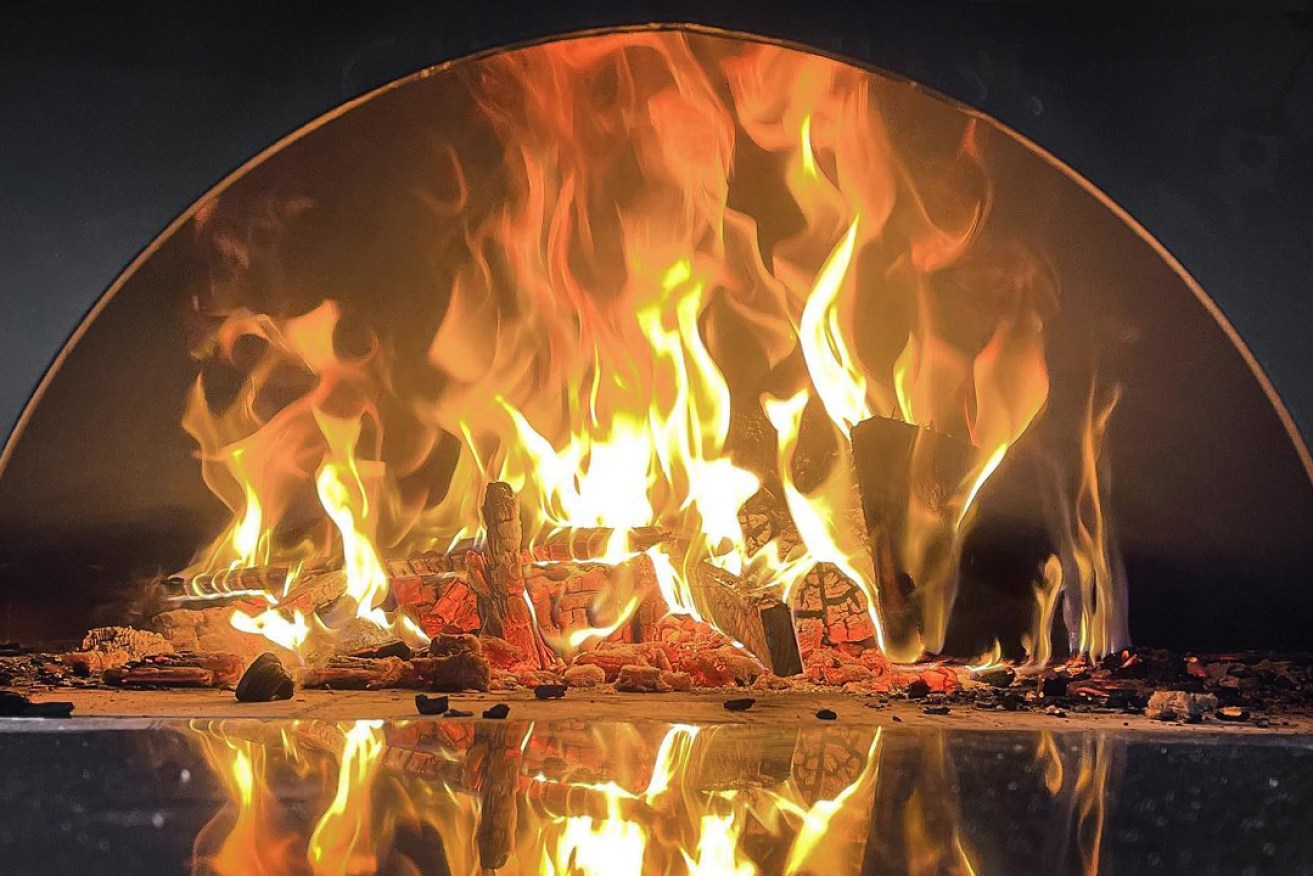
A wood-fired oven is at the heart of The Alchemists' Kitchen. Photo: Supplied
I’ve never been one for cults. The closest thing I’ve had to a religious experience is dinner at Noma, or perhaps Eleven Madison Park. There was that time I thought I saw the image of Jesus in a slice of toast as a child, but it turned out to be caused by a blown element in the toaster.
But I am one for research. A cookbook or Google helps when I’m investigating a particular cuisine or am unsure of an ingredient or preparation method, but a book sitting on the bar at The Alchemists’ Kitchen piqued my interest, after a recent lunch visit, and so off to the library I went. This 58-page guide to alchemy by Guy Ogilvy (also titled The Alchemist’s Kitchen, but with the apostrophe in a slightly different place) was a breeze. Half of the pages are pictures and diagrams, and the rest is, well, elemental.
At the beginning of the book reads the following caveat: Alchemy can be extremely dangerous. Explosions and poisonings are commonplace. Some of the processes described in this book may be unlawful in some jurisdictions; they are performed at your own risk.
I’m glad I read this warning after I’d eaten.
Earth, Wind, Fire and Water are key to the study of alchemy. Fitting, given our recent apocalyptic weather events. Today, there are no explosions or poisonings, although the lights do occasionally flicker as storms roll across the darkened skies above, and there is something lethal about the first round of the Alchemist’s Elixirs. Citrus-infused gin is mixed with lime and egg white, a lip-puckering first sip confirms this is a gin sour, worthy of its name. Next to it, a classic margarita has a similar resemblance, but there’s no mistaking the taste of good tequila, harmoniously balanced by a light orange scent and taste from its other ingredients. The rest of the drinks list ticks all the usual boxes, and all of the bottles of wine are more than reasonably priced.
In the opening paragraphs of Ogilvy’s study, he states that alchemists (more or less) believe that we, and almost everything else, are not all that we could be. Except gold. The story of alchemy, at least in the west, is, in a nutshell, the story of gold and our relationship with it.
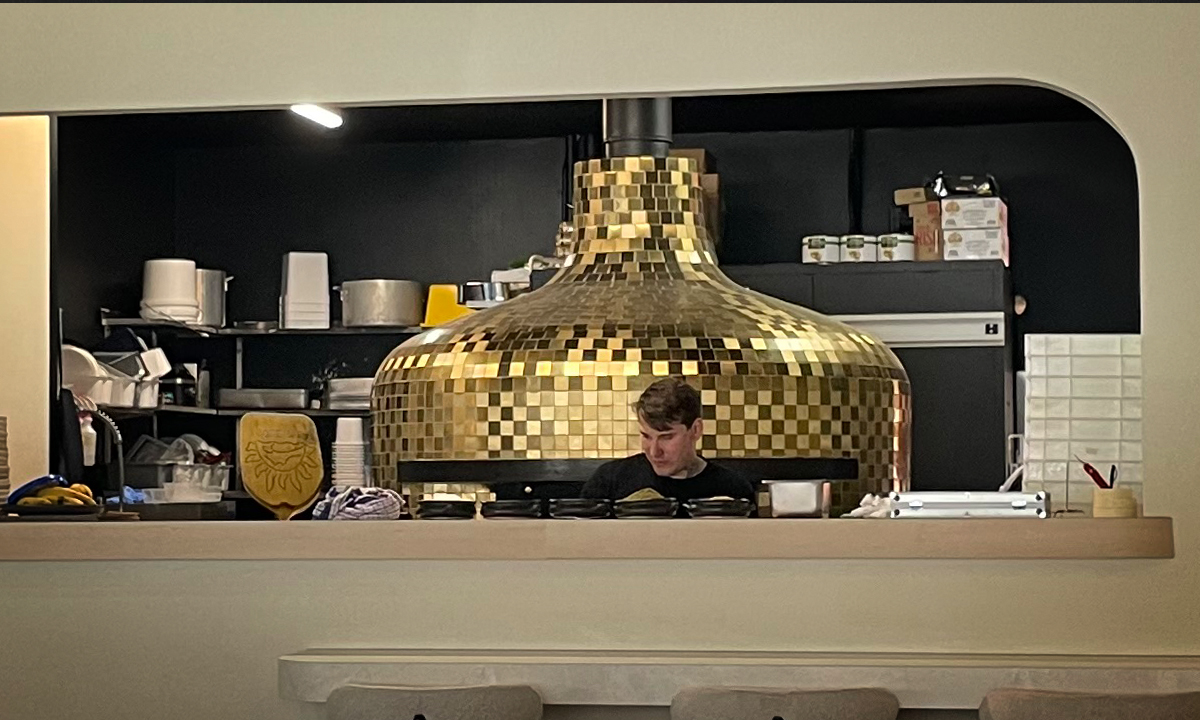
The gold-domed wood oven in The Alchemists’ Kitchen. Photo: Supplied
It’s fitting that the open kitchen here is wrapped around a huge bulbous central wood oven, tiled in shimmering gold. This is where most of the magic in this Alchemists’ kitchen happens, almost all dishes on the menu are touched by fire in some way.
Among many other weird and wonderful concepts, the book continues to discuss the elements and their impact on the world around us. It states that fire transforms things. It transformed our lives. It allowed us to bake clay into vessels for cooking, carrying, and storing; into bricks for building furnaces that could create sufficient heat to extract metal from rock and mould it into all manner of tools, first hammers and tongs, then blades.
Many centuries later, sitting here in this casual, monochromatic dining space, just metres away from the fire in the wood oven, we’re presented with four scallops, still attached to their shell, and served within seconds of being licked by the flames. Each mollusc is dripping in a piping hot Café de Paris butter, herbaceous enough to compliment the delicate flavour of the nicely cooked scallops, but not so flavoursome as to compete. These are a great start.
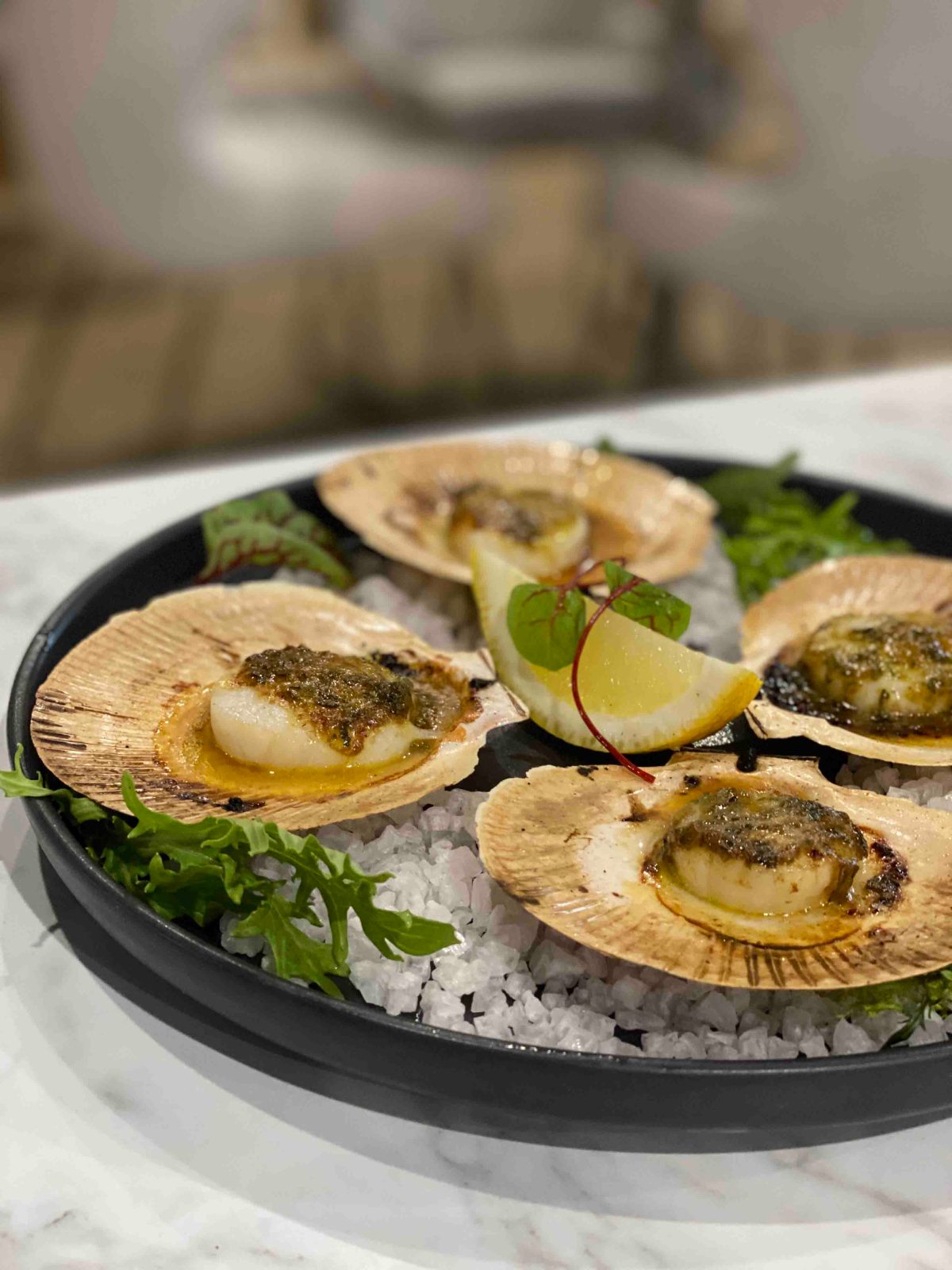
The Alchemists’ scallops. Photo: Paul Wood
Next comes arancini, in this instance a frier would have been used to crisp up these lovely little crumbed balls stuffed with a really good porcini and rice filling that has the expected texture, but some unexpected taste. Truffle is used generously in the centre, and outside too, thanks to a mayo that has a bit of a kewpie-like quality to it, but with a real (delicious) earthy punch. Arancini might not be a ground-breaking menu item, but these are quite tasty.
Of all the essential things that fire has helped humankind create, pizza has got to be right up there (next to hammers and tongs). Today’s is a simply prepared and perfectly cooked salami, on a tomato base with a blend of cheese that has great texture and stretch. I’ve added chilli honey oil, which gives a spicy hit to each bite. The edges have benefited from a light scorching in the oven and the base is that nice balance of pillowy and crisp as we work our way to the crust.
A vegetable side that could be served as a main is baby carrots (wood-fired, alongside everything else) doused in a middle eastern spice mix after roasting. Roughly chopped smoky almonds and toasted pepitas give some crunch and more of that fire-roasted flavour; leaves are used to brighten the dish and provide freshness.
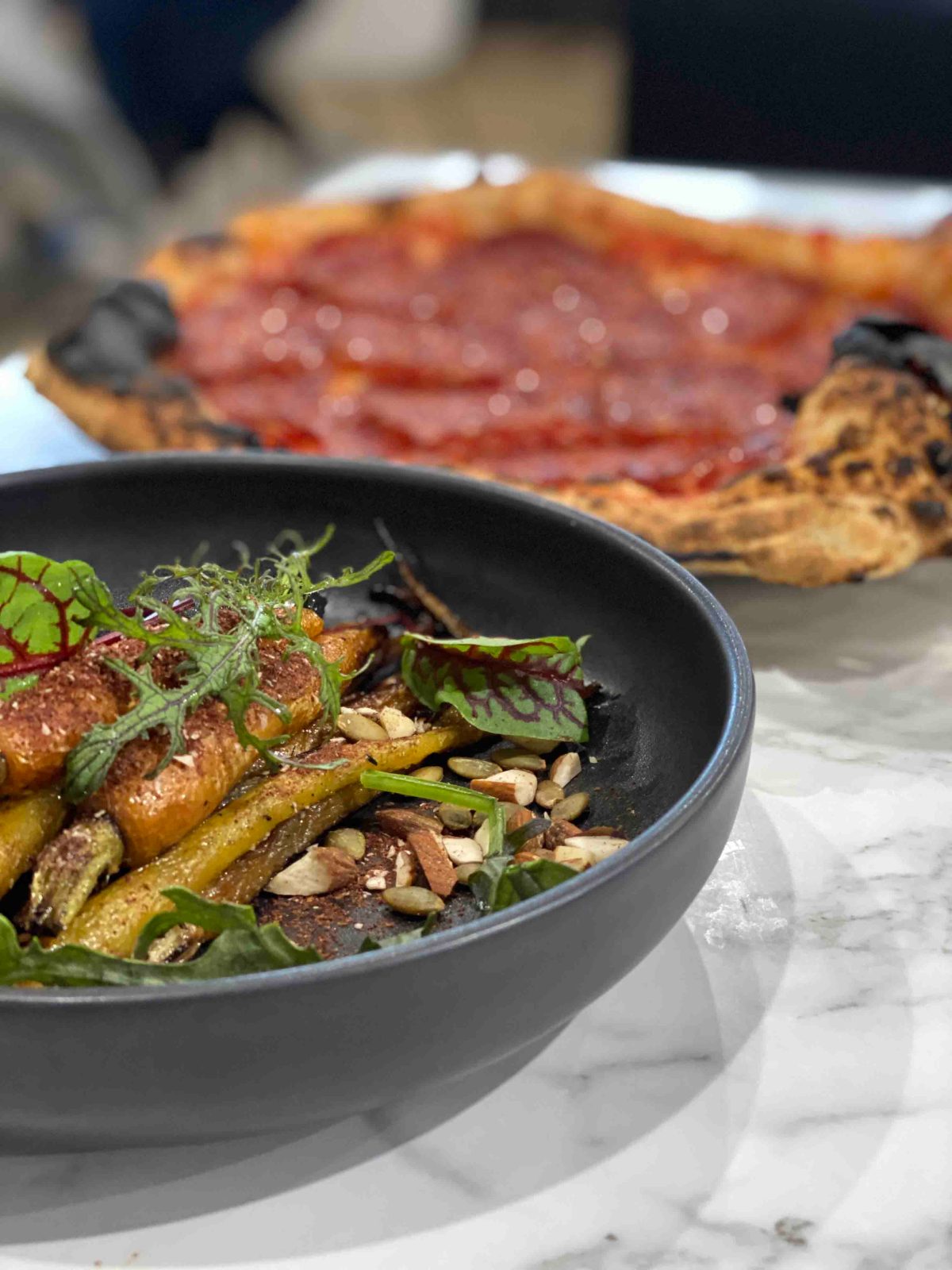
Carrots and pizza, licked by the flames in the wood oven. Photo: Paul Wood
And finally, wood oven chicken is given the royal treatment. This roasted and segmented bird is spread across what first appears to be a mash, but is in fact a delicious, middle eastern garlic sauce called toum. With the consistency of a puree, this silky smooth, nicely salted condiment has a hint of citrus. The chicken itself has been marinated in Chermoula, another herbaceous, garlicky and citrusy concoction that provides both flavour and a glaze to the crispy-skinned pieces. They clearly turned up the heat in the last minutes of cooking, demonstrating that when roasting good chicken, technique is everything. Roasted olives, charred baby onions, and some fresh garden leaves are all that’s needed to send this dish to the heavens (coincidentally a place, or a concept, that it also referenced throughout the ethereal study.)
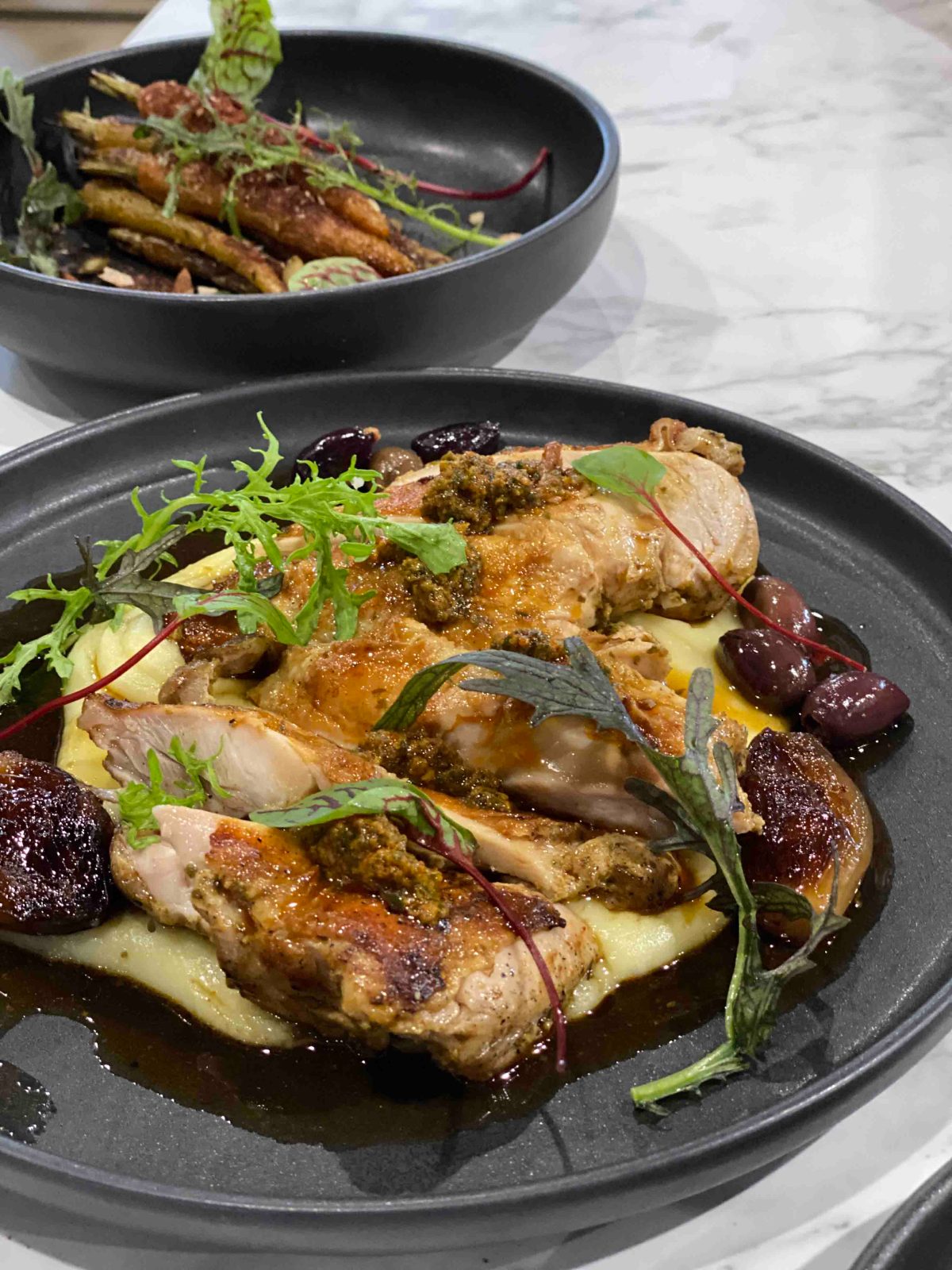
Chermoula chicken on a bed of toum. Photo: Paul Wood
The book ends with a chapter that includes more discussion about gold and the cosmos and making potions by the light of the moon and the sun, and it asks if the reader’s appetite has been whet. It certainly was at lunch.
And while a meal at The Alchemist’s Kitchen may not be a religious experience, or invoke any urge to join a cult, it does bring the elemental theories of alchemy together, harmoniously – at least in the kitchen and on the plate. I can’t quite say the same about the book which has left me with more questions than answers, about this strange, otherworldly subject.
The Alchemists’ Kitchen
81 Jetty Road, Brighton
Open: Wed/Thur 5pm-9pm, Fri-Sun 12pm-9pm
thealchemistskitchen.com.au
0493 269 140




